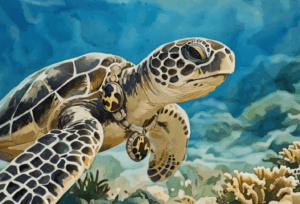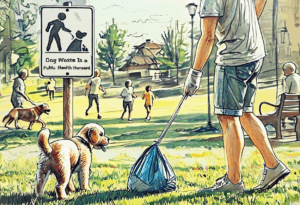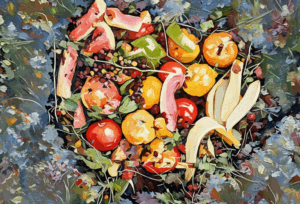
Val awoke to the sound or crying, like she did every morning. Her eyelids cracked, revealing the chrome steel ceiling that she slept under every night. She rolled out of bed and walked to the crib a few feet away.
The government assigned each North American citizen a house. Though, it wasn’t much more than a box with a door. Each house had enough room to fit two twin-sized beds, a small kitchen area, and a toilet. They didn’t even come with windows. Not that anyone wanted to look outside anymore.
Nine years ago, Valerie Park registered for a single home–which included a single twin bed–when she’d lost her previous home with her parents. She had asked for a crib when she registered because despite less than ideal conditions, she’d always wanted to start a family.
The government typically didn’t give citizens any extra beds or cribs unless they could prove that someone was living with them. But, she’d managed to lie to the goverment for six years, until she’d met Clara. An orphan just like her, Val adopted Clara from the orphanage near her home. Orphanages one thing the country had an abundance of.
Val didn’t know what really happened to Clara’s parents, but she could assume that they, like the majority of other citizens, met the same fate as her parents. Over the past decades, natural disasters had grown increasingly more severe and frequent. Although Val’s parents had learned how to survive and avoid them for the most part, they eventually met their match to a particularly large wildfire.
Val lifted Clara out of the crib and pulled her close to her. She bounced and shushed her quietly. “It’s okay. You’re okay,” she cooed. She brushed a blonde strand of hair from Clara’s forehead.
Usually, Clara only cried for one of two reasons. Either her diaper was full or she was hungry. After quickly turning Clara around to check, Val confirmed that it was the latter. “I know. I’m hungry too.” Finally, Clara’s cries died down and Val set her back in her crib.
Although Val had been taking care of herself for over a decade, getting food was still a challenge. There weren’t many jobs anymore in their futuristic society unless you knew how to build robots, which Val did not. On top of having no qualifications, Val also had no time for a job. She couldn’t spend an entire day away from Clara and there was no one else to look after her. Not that she’d trust anyone. That left her with one option.
Val grabbed the all-black suit that she always left on her kitchen table and walked to the other side of the room to change into it. There was no need for wardrobes or closets anymore since the suit was the only thing people could safely leave their houses in. Due to the intense UV rays that pierced through the non-existent ozone layer and hundred degree heat, the government was legally required to give each citizen a well ventilated, synthetic suit. Otherwise, anyone who stepped foot outside their home would immediately ruin their skin and possibly die of heatstroke.
With the suit, Val had at least 10 minutes before she’d really risk her health. She took the long scarf that she’d stolen from a woman on the street when she was seventeen from the table. She carefully wrapped the fabric around her face and neck until only her eyes and nostrils were exposed. She then grabbed a pair of lenses that were supposed to protect her eyes from the sun’s
rays. All that protection didn’t mean it was safe for her to go outside, but it did give her just enough time to steal some food for her and Clara.
She went back to Clara’s crib and scooped her into her arms. She held her for a few minutes and whispered, “I’ll be back,” before setting her down again. She could never guarantee that she would be back and she knew that Clara didn’t understand the promise that she whispered everyday. But, saying the words made Val want to fight just a little harder. She needed to make it back home. For herself. For Clara.
Val was nowhere near the only person that had resorted to stealing food. There were no restaurants anymore. All the food in Val’s state was kept in a large facility. With high temperatures, unpredictable rain and natural disasters, and ruined soil, produce was practically impossible to grow anymore. The government had found a way to grow very little in the North, far from Val’s state and her home. That’s where they kept the livestock too. Every few months, the government divided up any food that was edible and sent it to the food facility in each state, where they then sold it to the citizens. Fortunately for Val, her food facility was only a 5 minute walk from her home. That was the government’s first mistake: giving her a home so close to their precious food.
As soon as Val opened her front door, the sweltering heat threatened to turn her into a puddle where she stood. She tried to stay in the shadows as much as she could while she walked, which wasn’t too difficult considering the several tall buildings that were no more than an arm’s length from each other. Finally, she reached a 12 foot tall, electric fence. No matter how terrible the Earth was, the government would never run out of electricity or technology. Over a dozen guards stood on the other side of the fence. They couldn’t see Val, who was pressed up against the black wall of a building.
Sometimes she envied the guards in front of her. They had a job. They had food. Their families were safe. They didn’t have to stoop so low as to steal from the government that was providing for them.
She surveyed the position of the guards on the inside of the fence for a few moments before going back the way she came and walking around the building to the other side. Someone had managed to dig a hole below the fence before Val started stealing from the facility. The first time she’d come here, she’d made the mistake of going through it. The guards had spotted her and she’d made a mad dash for the facility. Since she was only sixteen then, they had sent her home with a warning when they caught her. But now, getting caught was punishable by death.
On this side of the building, one of the only trees in the state rested in front of the fence. The building was only a few feet from the tree, but she had to ensure that the guards wouldn’t spot her as she ran from the building to the tree. She waited for the three guards in sight to turn ever so slightly away. When they did, she moved to hide behind the tree trunk. Climbing the tree was easy. She’d done it thousands of times.
At the top several branches and thick leaves concealed her. When she’d first used this tree to enter the facility, the leaves were sparse and the branches were young. Luckily, they’ve grown.
One branch in particular stretched over the fence, nearly touching the roof of the food facility. That was the government’s second mistake: Making it so easy to get in.
Val crept along the branch, careful not to brush the leaves and draw attention to herself by making noise. She released the breath she was holding bit by bit as she crept closer to the roof. She was ready to fully exhale. She was almost there. Almost.
“Hey!” A guard below her shouted. A bullet flew past her arm. Another grazed her shoulder. She started sprinting as fast as she dared and when she reached the end of the branch, she launched herself at the roof. Another bullet past her foot so close, she’d thought that one had grazed her too.
She hit the roof hard, rolling to lessen the impact. Crap! She thought. Now that the guards knew she was here, they’d lock down the facility and block her exit. But, she couldn’t turn back now. She dug fingernails into her palm. For Clara. She opened the hatch, abandoning all caution and hope of being quiet.
It was foolish of the government to leave the hatch unlocked, believing their fence was more than enough protection. She raced down the stairs that led to the hall and followed her usual route to the food packaging room. Crates of food filled every corner, stacked ceiling high in this room. Usually Val took her time, carefully picking out items and rearranging them to look as if they’d never been touched. Not this time.
She grabbed the nearest crate, relieved to see actual produce and even a little meat in it. She used her non-injured shoulder to open the door and hurried back the way she came. Fortunately guards weren’t flooding the halls. Yet.
She knew every turn she needed to take and every door she needed to go through to get back to the roof. After she took the last turn, when she thought she was home-free, she barely avoided running head-first into a guard racing her way. Before the guard could even lift his gun, she dropped her crate and threw herself at him.
Catching him off guard, she knocked him to the guard and rammed her elbow into his face. She used the second that he was screaming in pain to rip the gun from his hand. She raced back to her crate, picking up a few of the items that had fallen out when she’d dropped it.
Through the door. Up the stairs. Onto the tree branch. Getting back onto the tree was always the hardest part after she’d acquired the food. It was considerably harder when she was holding a crate.
The hatch behind her suddenly flew open. The guard that she’d left in the hall emerged, holding his bloody nose with one hand. Val panicked and lept for the branch, crate in hand. She hadn’t expected to make it, but she’d hoped she would. Her heart leapt to her throat as her first foot hit, then slipped off the branch. Her second foot, however, hit the branch dead on, allowing her to bring her other foot up.
Her feet rapidly took turns stepping in front of her until she reached the thicker part of the branch and she felt stable.
She carefully lowered the crate onto the branches below her then herself until she was close enough to the ground to drop safely. Val hit the ground running. The guards hadn’t yet
reached the other side of the fence. She sprinted as fast as she could with her arms full with the crate.
She never thought she’d be so happy to cross the crunchy, dry grass. Feel the humid air stick to her skin and envelop her in a bubble of moisture. Feel the warmth–no, heat–on her face. A lot of heat.
She came to a halt so suddenly, she almost tripped. One hand flew to her face and horror filled her as her palm touched her bare cheek. Her scarf. She must have lost it at the food facility. She took off again, now even more desperate to make it back home.
Not only could the government possibly find her thanks to the DNA on her scarf, but she could no longer step outside without doing irreparable damage to her face, even for a minute. An overwhelming sense of relief washed over her as she stepped inside her house and closed the door. She leaned against it and slid to the floor. She pulled her knees to her chest, tight, and gripped her injured shoulder.
She greedily sucked in the cool air inside her house, grateful to have relief from the near fatal temperatures outside. She wanted to cry, if only to release the tension built up from her everyday grocery trip. She wasn’t in any excruciating pain yet. So, she couldn’t have burned too badly. But, still tears would only make things worse.
Instead, she leaned her head against the door frame and closed her eyes. She wasn’t sure how much longer she could last. How much longer she could feed Clara or take care of herself. Things only grew harder with each day and she wasn’t sure how long she had until, like the Earth, she gave out too.
Valerie sat up clutching her chest and breathing hard. She looked around her room in a panic. There was no crib. No toilet. No Clara. The realization came to her slowly. Clara didn’t exist. That world didn’t exist. It was a dream. Although Valerie hadn’t truly been caring for her baby, Clara, for years, her heart still broke for the loss of her imaginary daughter.
She got out of her bed and went to the window. The blinds were still shut from the night before. She pulled the short cord on the side to open them. Light filtered into the room. Not the harmful rays that would’ve scorched her skin as soon as they touched her. This light felt wonderful. It was warm. It was perfect. It was nothing like the rays in the other world that felt like standing in a fire, even behind a thick pane of glass.
The sky was a beautiful shade of blue, dotted with clouds to make a perfect painting. It lacked a dreary gray, even orangish hue. Everything was perfect. The box of snacks that she kept in her room. The food that was hers. That she didn’t have to steal. The absence of the hungry pit in her stomach. The green grass outside that replaced the previously barren, tropical landscape. She frowned as she spotted a small reflective bag on the grass outside her house. Seeing trash wasn’t uncommon, but that didn’t mean she liked it. In fact, she hated it.
She’d always been passionate about preserving the environment. Sometimes, she felt like she was the only person that cared about the effects of climate change. A month earlier, she’d submitted a proposal, a plea for her government to do something about the increasing emissions,
pollution, and environmental threats that humans posed every day. Just as she’d expected, they’d done nothing. They didn’t even bother responding to her message.
She sighed and went downstairs to remove the chip bag from her lawn. Once outside, she gave herself a moment to take in the world around her. She lived in a particularly wealthy neighborhood where at least a dozen of her neighbors enjoyed taking morning walks.
A woman held two dog leashes in one hand and her phone in the other. Val chuckled as she looked up from her phone in time to narrowly avoid walking into a telephone pole. Another couple behaved similarly, sparing one hand for their partner and using the other to hold their phone. No words were exchanged. They didn’t need to be. Everything was said virtually nowadays. Everything.
Val raced back into her house and up the stairs. It only took a few minutes for her to position her phone camera in front of a ring light on her desk. She didn’t use social media often, but she’d seen enough viral videos to know how to capture viewers’ attention.
She pressed the record button on her phone and waited for the countdown to hit zero. “We need to do something. Everyday, we ruin our Earth. We abuse the gifts it has given us. It’s time we do something about it. Not the government. Us. We have the power to do what they cannot. What they will not. There are thousands of ways we can take action: Taking bikes or buses, recycling, creating less waste, cleaning up the environment. For goodness sake! This is our home. Only we can make the small changes that it so desperately needs. Please take action to help our climate. In any way you can. It’s up to us. We are our Earth’s last hope.”
Sources:
https://climatechange.chicago.gov/climate-change-science/future-climate-change#:~:text=Future %20changes%20are%20expected%20to,larger%20future%20changes%20will%20be.
https://www.livescience.com/9281-global-warming-dire-prediction-year-3000.html
https://www.mcgill.ca/newsroom/channels/news/2500-earth-could-be-alien-humans-334080#:~:t ext=Unless%20CO2%20emissions%20drop%20significantly,a%20team%20of%20international %20scientists.
https://pubmed.ncbi.nlm.nih.gov/12293734/#:~:text=The%20model%20showed%20that%20hum an,in%20accordance%20with%20UN%20projections.
https://climateadaptationplatform.com/what-will-a-climate-changed-earth-look-like-in-2500/ https://richmond.com/limits-of-survival/article_ab7ee429-8e27-5a55-85ee-47e3e82276d5.html
https://www.un.org/sustainabledevelopment/climate-change/#:~:text=What%20happens%20if%2 0you%20don,will%20adversely%20affect%20every%20ecosystem.
The views and opinions expressed are those of the authors and do not necessarily reflect nor represent the Earth Chronicles and its editorial board.




